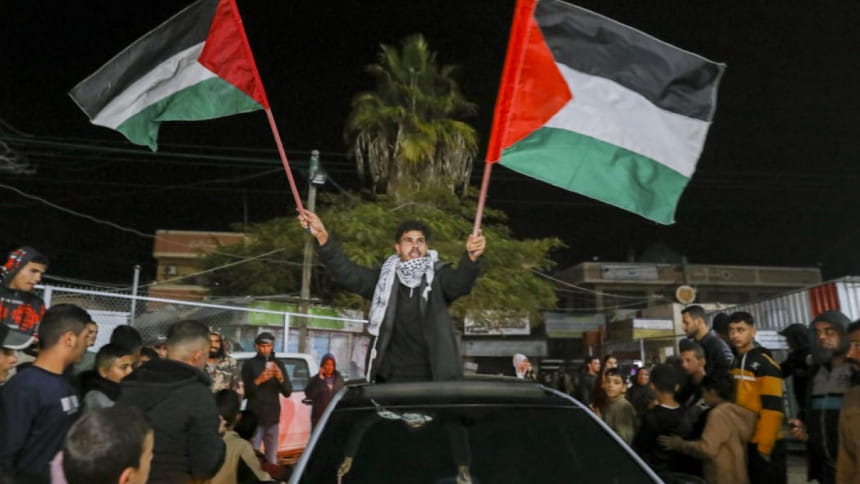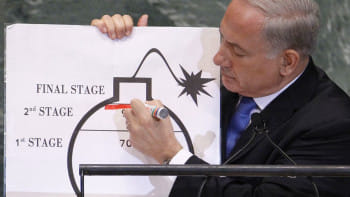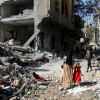Can life start again in Gaza?

After 467 days of massacre committed by the occupationist state of Israel—under the leadership of the fascist Benjamin Netanyahu—the people of Gaza can now dream of waking up to sounds and smells different from what they have been accustomed to: bombs, drones, gunpowder, and corpses. On January 15, Israel and Hamas reached a ceasefire deal that had been on the table since May last year. The next day, however, the Israeli cabinet delayed voting on the deal, accusing Hamas of backtracking although Hamas had accepted the agreement that was announced. It was expected that the deal would come into effect on Sunday, but the cost of the latest delay only means that more Palestinian lives will be lost, as it has been for each and every day that Netanyahu decided to pull out of ceasefire agreements.
Previously, the Biden administration seemed reluctant to apply enough pressure. The answer to the questions "Why now?" and "Why not months ago?" lie in the change of leadership in the US, in my opinion. In December, President-elect Donald Trump warned that if Israeli hostages in Gaza were not released, "it will not be good for Hamas and it will not be good, frankly, for anyone. All hell will break out." As I see it, this could not have been done by the outgoing President Joe Biden, as it long eluded his administration. President-elect Trump shares a friendship with Netanyahu, who reveres him. I suspect the delay from Netanyahu's side could also be until Trump takes office on January 20, so his resume will have the ceasefire written on it instead of Biden's.
Netanyahu's extremist cabinet has been against this deal; far-right ministers Itamar Ben-Gvir and Bezalel Smotrich have publicly ranted about how awful the deal is. Now, why would Netanyahu agree on a ceasefire that would cause division in his coalition? (When Ben-Gvir says he will bring down the "government," it essentially means he will quit the coalition.) The political calculus seems to have changed, and it may serve Netanyahu more to accept the deal this time than to reject it. And there could be two reasons for it. First, a trade-off could have been been offered, which could possibly be related to the annexation in the West Bank that Trump supported during his first term. The other possibility could be that Trump asserted that this war was no longer in the best interest of the US, but since he is unpredictable and reactive, Netanyahu, who faces criminal charges but wants to stay in power, would not risk going against the assertive incoming president.
In the end, Netanyahu did not achieve the "absolute victory" he spoke about, unless victory for him means the killing of thousands of children, women and men, destroying more than three quarters of Gaza, and starving its residents to death. The truth is he did not even achieve partial victory. He failed to eliminate Hamas, he failed to free the hostages, and he failed to undermine the resilience of Palestinians.
The ceasefire deal agreed upon also includes exchange of hostages, including Palestinian hostages held in Israeli prisons, and withdrawal of Israeli forces from Gaza in the first phase, which Netanyahu was opposed to. More importantly, the second phase of the deal promises "a permanent end to the war." There remains possibilities that this could be a temporary respite for the citizens of Gaza, and Netanyahu's commitment to the deal will face its biggest test in the second phase. The hope lies in Trump's ability to ensure the success of the deal, though his incoming administration is filled with staunch pro-Israel figures.
But, say, the deal endures, then what awaits the day after the war ends? For Netanyahu, he must face the arrest warrant from the International Criminal Court for heinous war crimes. He will have to face the indiscriminate killing of Palestinians, and most importantly, the abject failure to protect Israel's security on October 7, 2023. Israel as a state will have to reckon with genocide committed by its people, and the utter dehumanisation of Palestinians.
For Palestinians in Gaza, the ceasefire deal brings cautious optimism. As it was announced, the people of Gaza celebrated—an unusual sight in the rubble-filled strip. Al Jazeera's Hani Mahmoud, reporting from Deir-Al-Balah in Central Gaza, said, "For a couple of hours, people turned this whole area into a stage of celebration, something we are not used to seeing here as the area used to be a stage for funerals for the victims of war and a space filled with agony and sadness." Till the deal comes into effect, Israel will continue to commit massive atrocities, ending lives of innocent people as a reward for Netanyahu's hardline government, which believes a ceasefire to end mass suffering is akin to "surrender." Only when the ceasefire deal will go into effect will there be a sliver of hope that life can start again in the devastated Gaza Strip. But the ceasefire must not be conflated with liberation of the Palestinian people. The life that Palestinians have lived in an "open air prison" in Gaza is one of endless pain and violence committed against them by Israel. The life the whole generation of orphaned children will now live, after the genocide, is one scarred with bloodshed, trauma, and the battle to access basic human rights.
For the Palestinians, we must first be united as one, share our dreams, work together to achieve the hopes of our people, and not allow foreign interference that tries to impose on us solutions that do not meet our ambitions to fully recover our rights. Above all, we must stand by our brothers and sisters in the Gaza Strip to provide them with all the material and moral support we can, to alleviate their suffering and heal their wounds. Families have been wiped out, lives have been uprooted, and for those who survived, their hearts have been permanently broken.
Liberation of Palestinians will only happen the day we have the right to self-determination, the day we are treated as human beings with the right to live the way we want. As Palestinians were killed in their homes, the US and Israel, the perpetrators, talked about who would run the strip. The Biden administration has, for months, been trying to form an international security force that would work alongside an interim Palestinian administration to deal with civilian affairs. The US and Israel do not have the right to determine "who will run the strip." The day the world understands what's wrong with that criminal school of thought, we can start thinking about Palestinian liberation. But the resilience and movements around the world must continue for us to achieve our freedom.
Palestinian lives remain on the line till the ceasefire comes into effect, and rebuilding Gaza will be a task too difficult to put into words. There are many lessons Palestinians have learnt from this war, and things have forever changed after the most brutal war in our history. The world must reflect on the past 15 months of a horrendous genocide that happened in front of our eyes, on our screens, with the support of the powers that be. We must reflect on the biggest failure of humanity in modern times. At the same time, we Palestinians must also thank all those who have stood by our people and provided support in all its forms, most notably the people of Bangladesh.
Yousef SY Ramadan is the ambassador of Palestine to Bangladesh.
Views expressed in this article are the author's own.
Follow The Daily Star Opinion on Facebook for the latest opinions, commentaries and analyses by experts and professionals. To contribute your article or letter to The Daily Star Opinion, see our guidelines for submission.

 For all latest news, follow The Daily Star's Google News channel.
For all latest news, follow The Daily Star's Google News channel. 











Comments